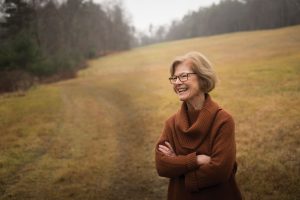
As a day student at NSFG, Margi Anderson fell in love with books and other cultures. No wonder, then, that she would live her life by the same themes: living abroad for many years with her husband, exploring communities in Asia, and reading every book she could. After NSFG, Margi earned her political science degree from the University of Wisconsin and then a master’s degree in social work from Fordham. She now splits her time between New Canaan, CT, and a farmhouse in New Hampshire. She’s involved in several Japanese-American book clubs, volunteers on a domestic abuse council, and participates in an academic lecture series.
Who at Williston had a strong impact on you?
Mrs. Cantarella, who was legendary. She scared the daylights out of all of us. She was about 4’11” and she had this huge voice. She always called us by our last names. And she would read us the Riot Act if we didn’t do something. She wasn’t afraid to tell us the writers that she hated, like Hemingway. Bottom line, we did a lot of reading and writing and she exposed us to a lot of good literature. Some that I still groan at, like Moby Dick. We spent so much time chasing a whale that year.
How did NSFG impact you?
Here was this very, very small school. It was tiny. But there were girls from all over. There were girls from Japan. Girls from the Clarke School for the Deaf. There were girls from South America. Girls from different parts of the country, and then local girls. I felt like, in a funny way, I was exposed to people I wouldn’t have been exposed to if I had been at the public high school. Considering I spent so much time in Asia, it was interesting to think how it opened me in ways I didn’t know until hindsight. I think there was an acceptance of all people, and that’s what I picked up from Miss Whitaker. That people are people and they’re interesting because they come from different backgrounds.
How did you spend your social time at NSFG?
We dated guys from Williston. We had mixers. Oh, geez. You’d sign up on a list and the girls would always be 5’10” and the guys would be 5’2”, and hopefully you’d get matched up with somebody your size. They were painful. You’d ride on a bus and get matched up with someone you had nothing in common with.
How have you maintained some of your friendships from NSFG?
Once a year in the summer we just get together and we have lunch together. It’s very nice to reconnect with these women whom I knew when I was 14, 15, 16 years old. And we see where our lives have taken us, all in very different directions. They’re all the same people underneath it all. It’s really lovely, and it’s very rare. We laugh at how weird we were and how awkward.
What are you up to now?
I’m involved in a Japanese-American group in New York and we organize small events. The idea is that there are Japanese women who travel here who might not have an opportunity to meet American women. We want to extend our friendship to them. It’s important to me because when I was in Japan, a friend introduced me to a women’s group. They welcomed me and helped me to understand what was so special and unique to Japan, and I felt like I wanted to give that back. It was such an important part of my life. There’s a commonality to the women who live overseas. You look at the world a little bit differently.

